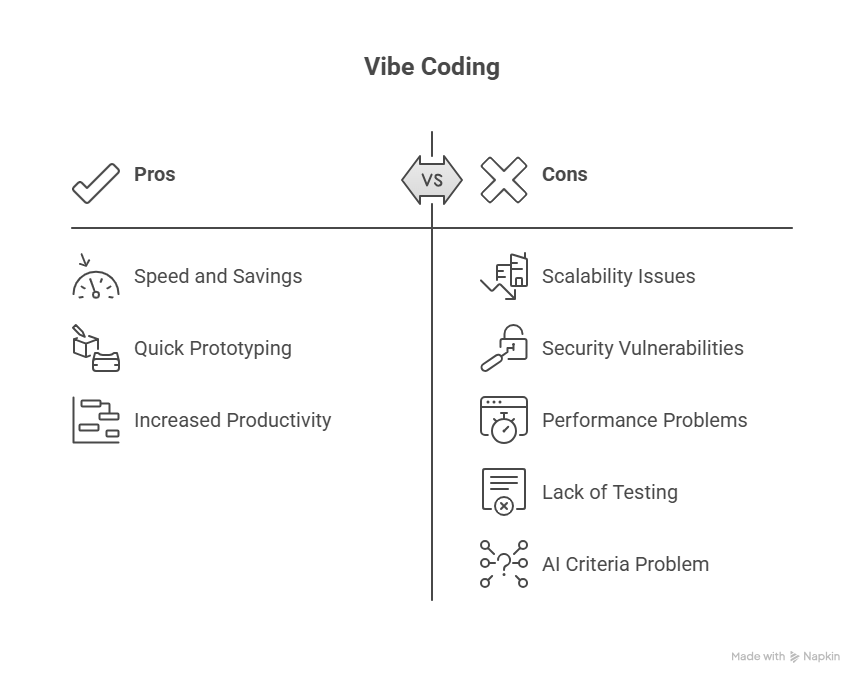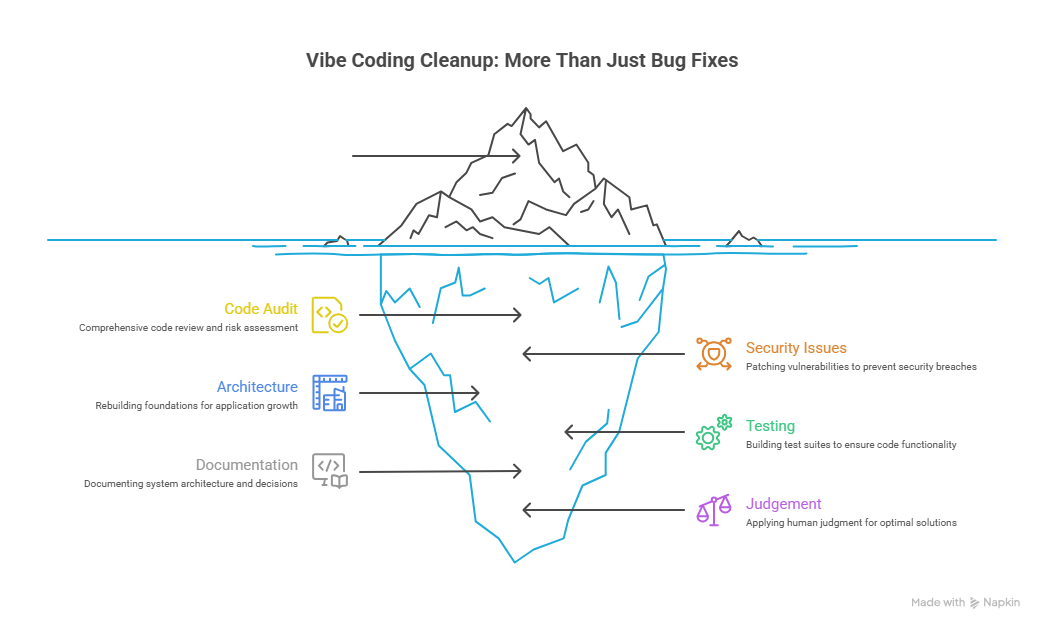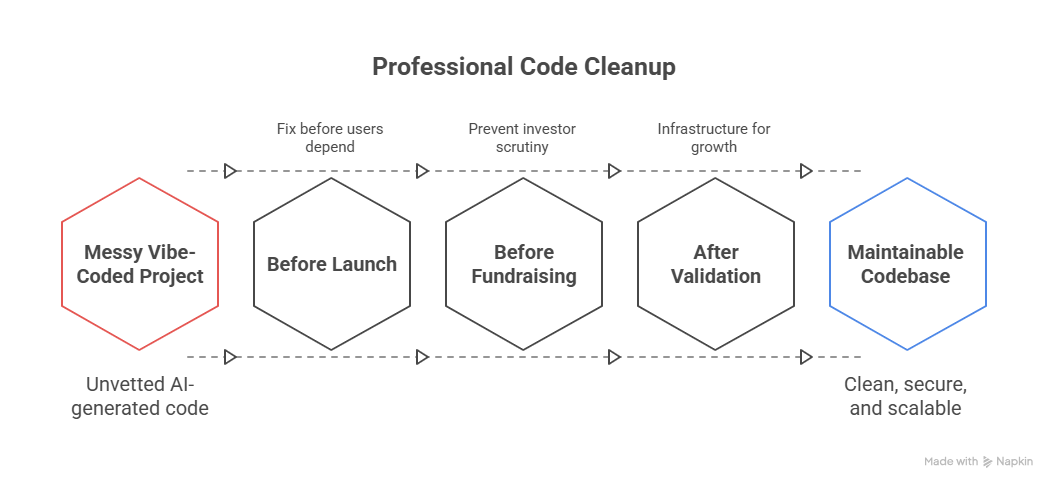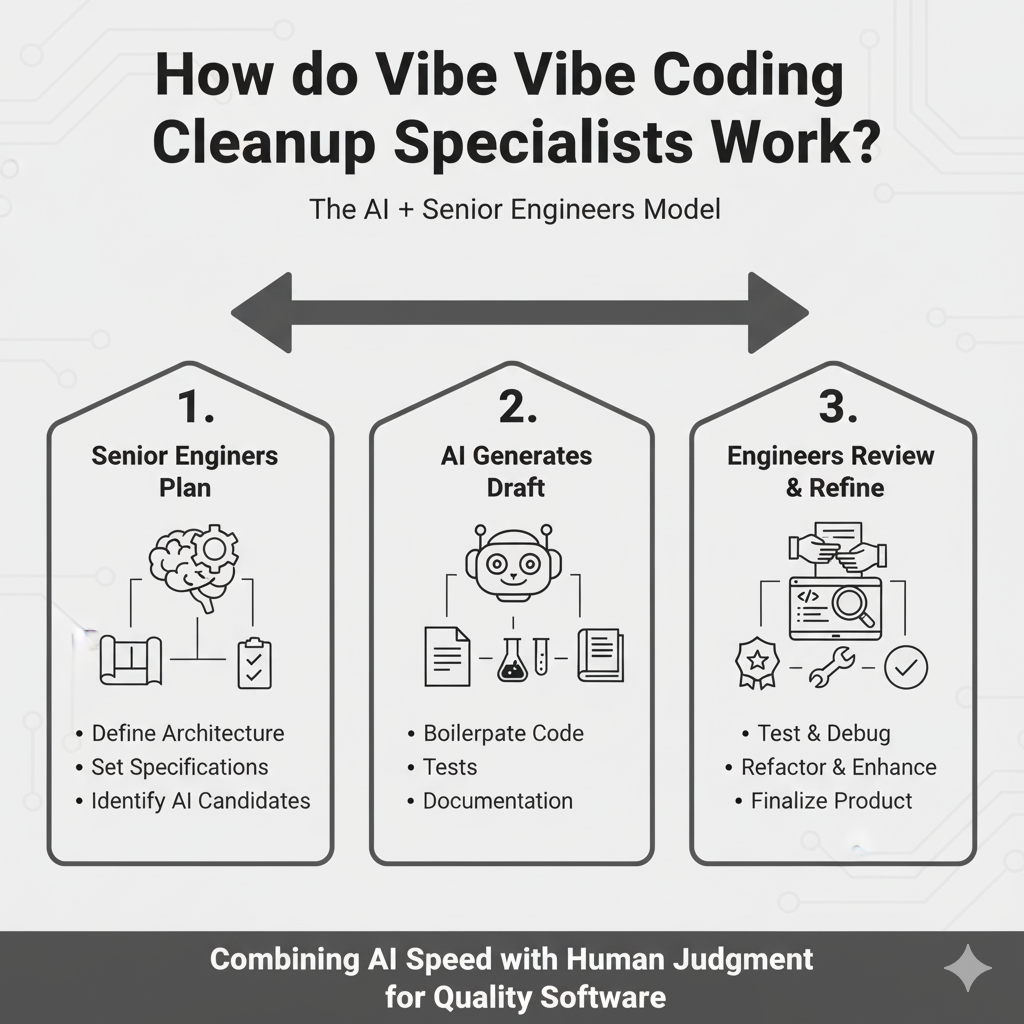
You spent three days building your MVP with Lovable. Maybe it was Replit, Cursor, or another AI coding tool. You went from idea to working prototype faster than you ever imagined possible. Your investors saw it. Your early users started signing up. Everything felt amazing.
Then reality hit.
The app crashes when more than ten people log in simultaneously. Your security audit revealed 47 vulnerabilities. Every time you try to add a new feature, something else breaks. Your developer looked at the codebase and said, "We need to talk."
Welcome to the world where vibe coding clean-up specialists have become one of the hottest jobs in tech. According to Belitsoft's analysis, about 25% of new startups now use AI for roughly 95% of their code. Even Google reports that AI writes more than 30% of its new code. This explosion in AI-generated code has created an entirely new profession: experts who transform rushed prototypes into production-grade software.
What is a Vibe Coding Clean-up Specialist?
A vibe coding cleanup specialist is a senior software engineer who specializes in fixing AI-generated code and transforming vibe-coded prototypes into secure, scalable, production-ready applications.
The term"vibe coding" refers to using AI coding tools like Lovable, Replit, or Cursor to quickly generate code from natural language prompts. You describe what you want in plain English, and the AI produces working code sometimes in minutes. It's fast, it's accessible to non-technical founders, and it's changing how startups build MVPs.
But there's a catch. AI-generated code typically works as a demo but has serious problems lurking beneath the surface.
The Controversy Behind the Role
The emergence of vibe coding cleanup specialists has stirred debate in the tech community. Some developers dismiss it as "AI babysitting," arguing that senior engineers shouldn't spend time cleaning up messes that AI creates.
TechCrunch interviewed experienced coders who compared working with AI-generated code to "giving a coffee pot to a smart six-year-old" or "hiring your stubborn, insolent teenager."
Others embrace the role, noting it allows them to focus on high-level architecture and system design rather than writing boilerplate code from scratch. The reality is that vibe coding excels at speed but fails at the details that matter for production systems.
Thinking About AI Automation But Don't Know Where to Start?
We help businesses pick the right automation approach and show you what actually works without the tech headaches.

Why This Job Exists Now?
The market for AI code cleanup specialists emerged because of a perfect storm:
Speed became everything. Startups needed MVPs yesterday. AI coding tools promised development 2-5 times faster than traditional approaches, according to industry research. Development costs plummeted—projects that once required 1,000 hours could suddenly be completed in 200 hours.
Non-technical founders could build. You didn't need a computer science degree or a technical co-founder anymore. Type what you want, get working code, and validate your idea. The democratization of coding seemed complete.
But technical debt piled up fast. The code worked well enough for demos, but couldn't handle real users, real security threats, or real business requirements. Founders discovered they'd traded upfront speed for backend chaos.
Enter the vibe coding cleanup specialist, the professional who bridges the gap between AI's impressive prototypes and production reality.
Why Does Vibe Coding Create Cleanup Needs?
Let's be honest about what happens with vibe coding. The promise is incredible, but the reality has sharp edges.

The Promise: Speed and Savings
Vibe coding delivers on its core promise. Research shows jobs that used to take weeks now finish in days. Startups build and launch basic products quickly, sometimes from a single prompt. Founders can create working prototypes without hiring a full development team, dramatically reducing initial costs.
From the outside, you look incredibly productive. One day's work produces what used to take a week.
Architecture and Scalability Issues
Founders want code fast and cheap. They use AI coding tools to build something that works right now and skip what seems unimportant like testing, proper architecture, or planning how different parts fit together.
This approach works fine for demos. Without proper code organization, though, your app might function, but won't scale. When more customers start using your product or you want to add features, you may need to rebuild most of it.
Security Vulnerabilities
When you ask an AI coding tool to write code, you probably don't think to request checks on user input, password hashing, or access controls. So the AI ignores security completely.
Tests show that asking AI to build a login page with no extra security details produces code vulnerable to SQL injection. AI-generated code built this way often violates company policies and industry standards. Experienced developers spot these vibe coding problems immediately.
Performance and Reliability Issues
AI-generated code often performs poorly. Pages load slowly. Database queries take forever. The application feels "heavy." Without proper configuration and optimization, apps start crashing or slowing down when multiple people log in simultaneously.
Small vibe-coded projects rarely include thorough testing. Founders assume AI-generated code will work, but edge cases and error handling are missing. Unit tests, documentation, and helpful error messages only appear when someone deliberately creates them.
The AI Doesn't Have a Criteria Problem
Here's the fundamental issue with vibe coding: AI doesn't know what good software looks like. It doesn't weigh trade-offs. It doesn't ask "should we even build this?" It just fills gaps with assumptions.
When you say "do it the best way" or "follow modern best practices," the AI tries, but with limited context. Even with detailed specs, someone needs to drive the AI agent, refine the requirements, and define what success actually means.
AI coding tools accelerate the process. Humans still own the thinking. That's where vibe coding cleanup specialists come in.
What do Vibe Coding Cleanup Specialists Actually do?
Vibe coding cleanup specialists don't just fix bugs. They transform flawed prototypes into production-grade systems through a systematic process.

Code Audit and Risk Assessment
The first step is understanding what you actually have. A code cleanup specialist reviews your AI-generated code comprehensively.
- Architecture review: How is the code organized? Does it have a coherent structure, or is it spaghetti? What happens when you need to scale?
- Security scanning: What vulnerabilities exist? SQL injection risks? Weak authentication? Data exposure? The specialist identifies every security hole that could become a breach.
- Performance analysis: Why is your app slow? Where are the bottlenecks? Which database queries need optimization? What's causing crashes under load?
- Tech debt measurement: How much accumulated mess exists? What needs immediate fixing versus eventual refactoring? What's the realistic cost to make this production-ready?
Fixing Critical Security Issues
AI code security fixes are typically the highest priority. Vibe coding cleanup specialists patch vulnerabilities that could destroy your business:
- Implementing proper input validation and sanitization.
- Fixing authentication and authorization systems.
- Securing API endpoints and data access.
- Adding encryption where needed.
- Correcting improper error handling that leaks sensitive information.
These aren't optional improvements. They're the difference between a functioning business and a catastrophic security breach that makes headlines.
Establishing Proper Architecture
AI-generated code rarely has good architecture. Code cleanup specialists rebuild foundations so your application can actually grow.
- Refactoring for maintainability: Breaking giant functions into logical components, organizing code into sensible modules, and establishing clear separation of concerns.
- Database optimization: Fixing inefficient queries, adding proper indexes, and restructuring data models for scalability.
- API design: Creating a consistent, well-documented interface between system components.
- State management: Implementing proper patterns for handling application state instead of the chaotic approaches AI coding tools typically generate.
Writing Comprehensive Tests
Most vibe-coded projects have zero tests. Vibe coding cleanup specialists build test suites that ensure your code actually works.
Unit tests verify that individual functions and components work correctly.
Integration tests confirm that different parts of your system work together properly.
End-to-end tests simulate real user workflows to catch issues before customers do.
Without tests, every deployment is a gamble. With proper test coverage, you can make changes confidently knowing you haven't broken anything.
Creating Documentation
AI-generated code comes with no documentation. Future developers or even you in three months won't understand how anything works.
Code cleanup specialists document:
- How the system architecture works.
- Why certain decisions were made.
- How to set up development environments.
- How to deploy updates safely.
- What each major component does.
Good documentation transforms a black box into an understandable system.
The Judgement AI can't provide
The most crucial role of vibe coding cleanup specialists is applying judgment. AI coding tools don't understand when to use a simple solution versus a complex one.
They don't know which performance optimizations matter and which are premature. They can't evaluate security trade-offs or decide when "good enough" is actually good enough.
Code cleanup specialists connect dots that AI can't see. They understand how today's architectural decisions affect tomorrow's feature additions. They know which shortcuts are acceptable and which will cause problems later.
Not Sure If Your Business Is Ready for Autonomous Automation?
BSkip the guesswork. We'll assess your processes and tell you exactly what to automate first and how to prepare properly.

When Should You Hire a Vibe Coding Cleanup Specialist?
Not every vibe-coded project needs professional cleanup. Sometimes the prototype is just for internal validation and gets thrown away. But certain situations absolutely require a code cleanup specialist.

Warning Signs Your Code Needs Help
You need AI code cleanup if
Security concerns arise. If you're handling user data, processing payments, or dealing with any sensitive information, unvetted AI-generated code is a lawsuit waiting to happen.
Performance degrades. Your app worked fine with five test users but crashes or crawls with 50 real ones. This means fundamental performance problems in the vibe-coded architecture.
You can't add features. Every time you try to add something new, other things break. The codebase has become so tangled that changes are unpredictable.
You're raising investment. Technical due diligence from investors will reveal vibe coding problems immediately. Having code professionally cleaned up before investor scrutiny is critical.
You're hiring developers. Good engineers will run away from messy AI-generated code. If you want to build a team, you need a maintainable codebase.
Regulatory compliance matters. Healthcare, finance, education—any regulated industry requires code that meets specific standards. Vibe coding rarely produces compliant code.
Best Timing for Cleanup
Before launch is ideal, fix everything while you still have time, before users depend on your system working perfectly. AI code cleanup is easier when you're not simultaneously managing a live product.
Before fundraising, it is crucial that investors conduct technical due diligence. Having messy vibe-coded systems can kill deals or dramatically reduce valuations. Professional vibe coding cleanup services prevent this.
After validation, before scale is the sweet spot. You've proven people want your product. Now you need infrastructure that can handle growth. This is when code cleanup specialists provide maximum value.
What Happens if You Wait Too Long
Security breaches that destroy trust and trigger lawsuits, performance crises that drive users away during growth moments, developer exodus when good engineers refuse to work with terrible code, missed opportunities because you can't move fast enough to compete, complete rewrites that cost 10x more than early cleanup would have
How do Vibe Coding Cleanup Specialists Work?
Understanding the vibe coding cleanup process helps you know what to expect when hiring specialists.

The AI + Senior Engineers Model
Modern code cleanup specialists aren't anti-AI. The best firms use AI coding tools as part of their cleanup process.
Senior engineers plan the architecture before any AI writes code. They define clear specifications, identify which components are suitable for AI-generated code, and which require human expertise.
AI generates initial code for well-defined, routine tasks like creating boilerplate, writing tests, converting data formats, or generating documentation.
Engineers review and refine everything. The AI-generated code serves as a draft. Every line gets tested, reviewed, and enhanced before becoming part of the final product.
This hybrid approach combines AI's speed with human judgment. A single senior developer leveraging AI coding tools appropriately can produce output that previously required several developers, but only when human oversight ensures quality.
How Vibe Coding Cleanup Specialists Differ From Traditional Developers
Code cleanup specialists approach problems differently than developers building from scratch:
They start with constraints. Traditional developers begin with a blank slate. Cleanup specialists work within existing systems, determining what to keep, what to fix, and what to rebuild.
They prioritize based on risk. Not everything needs fixing immediately. Vibe coding cleanup specialists identify what's dangerous (security holes, data loss risks) versus annoying (slow performance, poor UX) versus cosmetic (code style issues).
They're archaeology experts. They need to understand what the AI was trying to do, why it made certain choices, and how the pieces fit together—often without documentation or clear logic.
They focus on production readiness. The goal isn't perfect code. It's code that works reliably, securely, and maintainably in production. Cleanup specialists know the difference.
Want Automation Built Specifically for Your Business?
We build custom AI automation systems that work exactly how your team needs them. Let's talk about your goals and make it happen.

The Future: Is This Job Temporary or Permanent?
The big question founders and specialists ask: Will better AI coding tools eliminate the need for vibe coding cleanup specialists?
Will AI Improvements Solve the Problem?
Some believe improved AI models will eventually generate production-quality code directly, making cleanup unnecessary. As AI gets smarter, won't it write better code?
Maybe. But there's a fundamental challenge AI hasn't solved: judgment.
AI doesn't know your specific business context, your scaling plans, your risk tolerance, or your budget constraints. It doesn't understand the trade-offs between speed and security, between flexibility and simplicity, between cost and performance.
Even if AI writes syntactically perfect code, someone still needs to ensure it solves the right problems in the right way.
The Co-Pilot Principle
The tech industry is converging on a consensus: AI works best as a co-pilot, not a pilot.
AI handles the routine: Boilerplate code, test generation, documentation, simple refactoring, and pattern implementation.
Humans handle judgment: Architecture decisions, security trade-offs, performance optimization priorities, business logic validation, and system design.
Companies succeeding with AI-generated code treat AI coding tools as productivity multipliers for experienced engineers, not replacements for engineering expertise. The vibe coding cleanup specialist role reflects this reality, specialists who understand both AI's capabilities and its limitations.
Conclusion
Vibe coding changed startup development forever. The ability to go from idea to working prototype in hours rather than months is genuinely revolutionary. Non-technical founders can validate ideas, show investors, and reach early users without hiring full development teams.
If you've used AI coding tools to build your MVP, you made a smart decision. You validated your idea quickly and cheaply. Now make the second smart decision: get professional help transforming that prototype into production-ready software before the technical debt crushes your growth.
We specialize in vibe coding cleanup services for startups. From AI code security fixes to complete production preparation, we transform vibe-coded prototypes into reliable, scalable systems.
FAQs
What is a vibe coding cleanup specialist?
A vibe coding cleanup specialist is a senior software engineer who specializes in fixing AI-generated code. They transform vibe-coded prototypes built with tools like Lovable, Replit, or Cursor into secure, scalable, production-ready applications by addressing security vulnerabilities, performance issues, and architectural problems.
When should I hire a vibe coding cleanup specialist?
Hire a code cleanup specialist before launching to real users, before raising investment rounds, or when you notice security concerns, performance problems, or difficulty adding features. The ideal time is after validating your idea but before scaling operations.
Can't AI just generate better code from the start?
While AI coding tools are improving, they lack business context, judgment about trade-offs, and understanding of your specific requirements. AI-generated code works well for prototypes but typically needs human expertise to become production-ready, secure, and scalable.
What's the difference between vibe coding cleanup and regular code refactoring?
Vibe coding cleanup specialists specifically understand how AI coding tools generate code and the unique problems this creates. They work within constraints of existing AI-generated code, prioritizing security and production readiness rather than perfect code architecture.
Will better AI eliminate the need for cleanup specialists?
Unlikely in the near future. Even as AI coding tools improve, humans provide business judgment, context understanding, and strategic decision-making that AI can't replicate. The role will likely evolve toward higher-level concerns rather than disappear entirely.

